#curating expositions
Text
I really fucking love my History major, dude
#people out here like: oh no I fucked up i picked wrong#can’t relate#I literally actively try to not miss classes#I love going to class and learning more#everything falls into place right before my eyes#and I love it#I really really love my major#I know being passionate about what you do is a capitalist invention#but I am truly passionate about it#like everything I do that relates to it#my heart swells with it#teaching#writing#investigating#curating expositions#I enjoy all of it so much#i am lucky that way#unlucky on other ways but I won’t go in depth here#cuz the point is: I love history
2 notes
·
View notes
Text


by melodyinsoko
#seoul#south korea#korea#book store#aesthetic#light academia#exposition#cottagecore#fairycore#flowers#photography#curators on tumblr#up
2K notes
·
View notes
Text
ngl besties I'm struggling with AFFC a little because honestly it feels like we've taken a detour into Side Quest Central
#♛ ooc. ⊱ ❝ 𝘖𝘩 𝘯𝘰 𝘪𝘵'𝘴 𝘔𝘢𝘳𝘪. ❞#there is just so much Not happening right now lmao#so much of it feels too detached from the main plot for me to care about#I'm devouring the cersei & jaime & sansa & arya chapters#and arianne and brienne have their bright spots#but a lot of it just feels??? couldn't some of this have been some exposition instead ASFDJJLKF#like did we really need the greyjoy plot spread out across so many chapters and characters#I say this as a greyjoy enjoyer (do not judge me) but a lot of this could have been condensed#and the dornish plotline is . . . not hitting the way I thought it would. I am so sorry.#again!! there are bright spots!! esp with arianne but it's like. idk.#it's one of those plotlines that feels oddly detached despite being extremely important#and I wholly blame that on dorne not being an actual present factor in the books until this book (outside of oberyn)#like the first three books felt very focused in the characters and plots they would follow#but now there are two entire branches of plots introduced suddenly in the fourth book and sometimes it feels like a different series#it's still good it's just!! adhd brain struggling#it's gotten to the point where I will check the next few chapters to see who the pov characters are#and I will curate how much I plan to read that day based on *who* I have to look forward to RIP
2 notes
·
View notes
Text
*** Barcode Series /
Natal Village -3- 3 May 2022
"Adil ES-SAFI" Morocco
*** Série Code-barres / Village Natal -3- 3 Mai 2022

"Adil ES-SAFI " Maroc
#art#public art#photography#streetart#art exibition#exposition#dubai expo#exhibition#museo#musée#musee des beaux arts#curators#curateurs#modernabstract#modernart#modern#visualgraphic#visualart#artist on tumblr#artists on tumblr
17 notes
·
View notes
Photo

🥂 You are cordially invited to our DF Art Project 3rd Exhibition in the beautiful Parc Floral de Paris! October 1 - 10 @des_fig @des_fig_group @hybridscrib #destructuralismefiguratif #exhibition #parisexhibition #exposition #expo #paris #parisexpo #quefaireaparis #parismaville #artist #curator #artcurator #gallery #galleries #galerie #parcfloral #parcfloraldeparis #share #flyer #exhibitionart #artfair #artfairparis #buyart #loveart (at Parc floral de Paris château de Vincennes) https://www.instagram.com/p/CiPZ7XujZEf/?igshid=NGJjMDIxMWI=
#destructuralismefiguratif#exhibition#parisexhibition#exposition#expo#paris#parisexpo#quefaireaparis#parismaville#artist#curator#artcurator#gallery#galleries#galerie#parcfloral#parcfloraldeparis#share#flyer#exhibitionart#artfair#artfairparis#buyart#loveart
1 note
·
View note
Text
Eight Strategies for Improving Dialogue in Your Writing
Well, hi! Oh my… wow! It’s been a long time since I’ve posted! I’ve been very busy and I am genuinely sorry to all my followers, but that doesn’t mean I’ve forgotten about this account, but here is one final post for the year!
Hopefully next year I become consistent with it again!
Let’s begin!
One of the best ways to help a reader connect with your writing is by crafting excellent dialogue. Use these tips to learn how to write dialogue that showcases character development, defines your characters’ voices, and hooks readers.
Why Use Dialogue?
Good dialogue performs all sorts of functions in fiction writing. It defines your characters’ voices, establishes their speech patterns, exposes the inner emotions, and showcases their character development. Beyond mere characterization, effective dialogue can also establish the setting and time period of your story and reveal information in a way that doesn’t feel overly expository.
Authors use lines of dialogue to reveal a character’s personality and express their point of view. For instance, an archetypal football coach might speak in short, terse sentences peppered with exclamation points and quotations from famous war generals. By contrast, a nebbish lover with a broken heart might drone on endlessly to his therapist or best friend, speaking in run-on sentences that circle around his true motivations. When an author can reveal character traits through dialogue, it cuts down on exposition and makes a story flow briskly.
Eight Writing Tips for Improving Dialogue
The first time you write dialogue, you may find it quite difficult to replicate the patterns of normal speech. This can be compounded by the concurrent challenges of finding your own voice and telling a great story overall. Even bestselling authors can get stuck on how a particular character says a particular line of dialogue. With practice and hard work, however, lackluster dialogue can be elevated to great dialogue.
Here are some strategies for improving the dialogue in your own work:
Mimic the voices of people in your own life. Perhaps you’ve created a physician character with the same vocal inflections as your mother. Perhaps your hero soldier talks just like your old volleyball coach. If you want to ensure that your dialogue sounds the way real people speak, there’s no better resource than the real life people in your everyday world.
Mix dialogue with narration. Long runs of dialogue can dislodge a reader from the action of a scene. As your characters talk, interpolate some descriptions of their physical postures or other activity taking place in the room. This mimics the real-world experience of listening to someone speaking while simultaneously taking in visual and olfactory stimuli.
Give your main character a secret. Sometimes a line of dialogue is most notable for what it withholds. Even if your audience doesn’t realize it, you can build dynamic three-dimensionality by having your character withhold a key bit of information from their speech. For instance, you may draft a scene in which a museum curator speaks to an artist about how she wants her work displayed—but what the curator isn’t saying out loud is that she’s in love with the artist. You can use that secret to embed layers of tension into the character’s spoken phrases.
Use a layperson character to clarify technical language. When you need dialogue to convey technical information in approachable terms, split the conversation between two people. Have one character be an expert and one character be uninformed. The expert character can speak at a technical level, and the uninformed one can stop them, asking questions for clarification. Your readers will appreciate it.
Use authentic shorthand. Does your character call a gun a “piece” or a “Glock”? Whatever it is, be authentic and consistent in how your characters speak. If they all sound the same, your dialogue needs another pass.
Look to great examples of dialogue for inspiration. If you're looking for a dialogue example in the realm of novels or short stories, consider reading the great books written by Mark Twain, Judy Blume, or Toni Morrison. Within the world of screenwriting, Aaron Sorkin is renowned for his use of dialogue.
Ensure that you’re punctuating your dialogue properly. Remember that question marks and exclamation points go inside quotation marks. Enclose dialogue in double quotation marks and use single quotation marks when a character quotes another character within their dialogue. Knowing how to punctuate dialogue properly can ensure that your reader stays immersed in the story.
Use dialogue tags that are evocative. Repeating the word “said” over and over can make for dull writing and miss out on opportunities for added expressiveness. Consider replacing the word “said” with a more descriptive verb.
896 notes
·
View notes
Text
A Philosopher's Lexicon: Vocab that'll make you sound like an academic
Although curated by a philosophy major for philosophy, the following list of vocabulary is a great addition to any intellectual's written or spoken lexicon!
Verbs to Replace "Says" or "Thinks"
Asserts
Affirms
Argues
Contends
Expounds
Posits
Postulates
Delineates
Reiterates
Conjectures
Refutes
Disputes
Verbs to Replace "Shows" or "Explains"
Elucidates
Demonstrates
Validates
Substantiates
Corroborates
Vindicates
Exemplifies
Enumerates
(There's a bit of room for overlap between the "Says" or "Thinks" list and the "Shows" or "Explains" list).
Words to Describe Perspectives or Approaches
Holistic
Myopic
Dogmatic
Pragmatic
Empirical
Normative
Prescriptive
Descriptive
Reductionist
Relativistic
Utilitarian
Absolutist
Subjectivist
Objectivist
Positivist
Words to Describe Statements
Incontrovertible
Pertinent
Cogent
Nuanced
Dialectical
Syllogistic
Empirical
Normative
Didactic
Esoteric
Transitional Phrases
Moreover
Consequently
In contrast
Furthermore
As such
Henceforth
Therefore
In light of this
By the same token
To that end
Words for Critique, Analysis, or Inquiry
Scrutinizes
Deconstructs
Mitigates
Substantiates
Vindicates
Invoke
Inquiry
Interrogate
Delineate
Explicate
Reconcile
Synthesize
Undermine
Engage
Evoke
Scrutiny
Descriptive Words for Ideas or Concepts
Paradigm
Construct
Framework
Epistemology
Ontology
Teleology
Dialectic
Axiom
Maxim
Tenet
Doctrine
Dogma
Words for Nuanced Argumentation
Corollary
Inference
Premise
Deduction
Induction
Syllogism
Refutation
Rebuttal
Concession
Adjudication
Exposition
Elucidation
Conjecture
Remember, the key is not just to use these words, but to understand them fully so you can wield them effectively. Context is king; make sure the word or phrase fits seamlessly into your argument.
_________
Imagine trying to cram all those words into just a couple of paragraphs... not saying you should do it, but it might be a fun challenge, no?
If you're interested in more academic writing tips, feel free to explore the #AcademicWriting and #WritingTips tags on my blog. To distinguish between my original content and reblogs, you can filter the tags #LiaLifeLounge and #LiaReblogs, respectively.
Have fun writing! ✨
#AcademicWriting#WritingTips#writing advice#Philosophy#Vocabulary#writing#academia#student tips#writing tips#writing resources#college student#mindmatters#LiaLifeLounge
250 notes
·
View notes
Text
Curated list of Rain World analysis I like
The Ancients
dragonpropaganda on popular misconceptions about the Ancients' culture
ikayblythe's speculative biology
kociamieta's notes on Ancient character design
Character analysis
eliias-bouchard on NSH's portrayal
ikayblythe on Pebbles' age and motivations
pocket-goat's thoughts about Moon in the context of the Saint campaign
shkika on Moon and Pebbles' relationship
shkika on whether Moon and Pebbles are siblings
skybristle's and my own thoughts on the decay of Moon's organic parts
General speculative biology
chaotic-minds-think-alike's interpretation of lizards
dragonpropaganda on the relationship of purposed organisms to ingame fauna
flickering-nightfall's interpretation of the reproductive strategies and social structures of various species in the game
Iterator anatomy
bonniesband's exposition on the Rot as a type of cancer
copepods and myself on whether parts of post-collapse Moon beyond the puppet could be conscious
copepods on viewing iterators as more than the puppet
delta-orionis' method for estimating the height of Iterator cans
orangedoorhingeinstorage and kayjaypax on movable components in the memory conflux and adjacent systems
skybristle's and my own thoughts on the decay of moon's organic parts
my theory about how an Iterator's memories are stored and why Moon doesn't forget anything when she loses a neuron
Iterator puppet anatomy
aluminum-angels' interpretation
bitsbug's puppet interpretation
copepods' mechanical interpretation:
moon & pebbles / post-collapse moon
flickering-nightfall's journey to understand the puppet arm:
part 1 / part 2
flickering-nightfall on the "umbilical"
ikayblythe's arthropoidal interpretation:
overview / endoskeletons / "skin"
joowee-feftynn observes that puppets can't walk
spotsupstuff on the relationship between puppet and can
trashiiplant's ragdoll interpretation
yellowsnacc's "jello-covered skeleton" interpretation
Slugcat anatomy
arrayydee's slugcat design
artihunter's take on the fur/slime question
dopscratch's mollusk/mustelid interpretation
honey-marrow's interpretation of Spearmaster's anatomy
Themes and storytelling
comrade-slugcat and myself on themes of inevitability and futility in Monk & Survivor's campaigns
dragonpropaganda on how Rain World's level design is based on the idea of civilizations successively building upon each others' ruins
grunckle's theory relating ascension, void worms, and voidspawn together through the idea of qualia
grunckle's illustration of the parallels between the iterators and void worms and some connections to Gnosticism
seventeendeer on the thematic significance of ascension and the player's agency in choosing it
Miscellaneous
bitsbug and ikayblythe discuss the age of the ecosystem
flecks-of-stardust's theory that (in vanilla) the Chimney Canopy pearl was created by Five Pebbles
ikayblythe's speculative geology of the surface and void sea
my theory on the meaning of "HR_LAYERS_OF_REALITY"
my timeline of architecture on the surface
rw-me elaborates on the canonicity of Downpour
shkika on the distances between members of the local group
shkika, flecks-of-stardust, and fluffybunny35 discuss why it rains in Shaded Citadel
soaricarus, flickering-nightfall, and myself on why Seven Red Suns is probably not a member of the "local group"
yunnifo discusses Rivulet ending projections
133 notes
·
View notes
Text
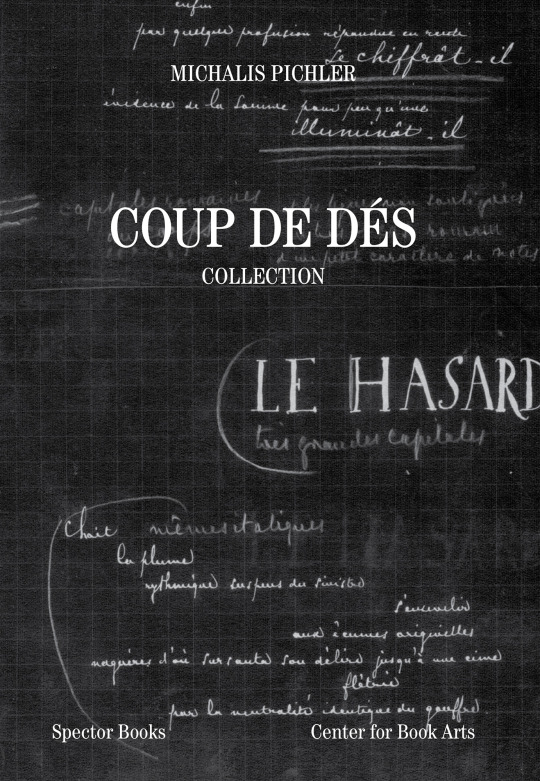
Coup de dés (Collection). Books and Ideas after Mallarmé, (offset, sewn binding, paperback), Edited by Michalis Pichler, Spector Books, Leipzig / Center for Book Arts, New York, NY, 2024 [Books on Books]

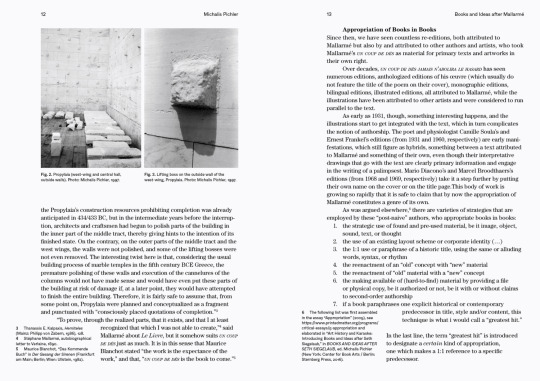
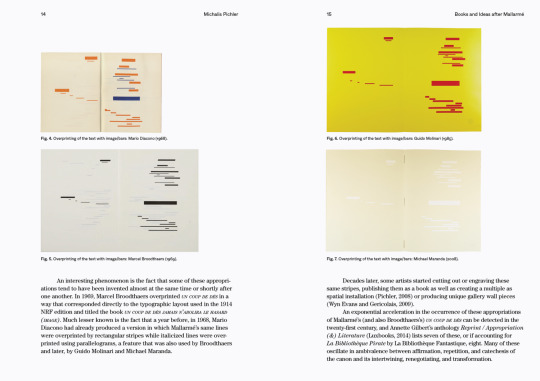








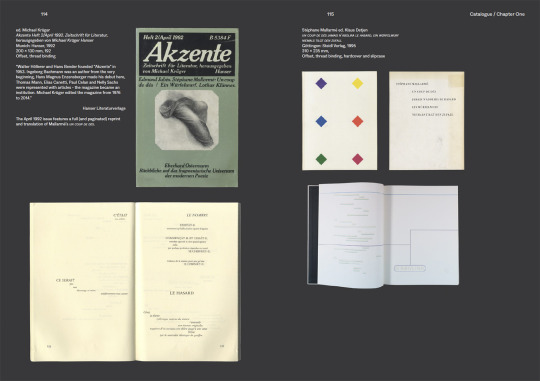
Contributors: Luc Boltanski, Craig Dworkin, Arnaud Esquerre, Annette Gilbert, Michalis Pichler, Ryoko Sekiguchi
Design: Maira Fragoso Peña, Ott Kagovere
Published on occasion of Exposition littéraire autour de Mallarmé, Curated by Michalis Pichler, Center for Book Arts, New York, NY, January 18 – May 1, 2024
#graphic design#typography#art#poetry#visual writing#visual poetry#exhibition#book#catalogue#catalog#cover#book cover#stéphane mallarmé#michalis pichler#luc boltanski#craig dworkin#arnaud esquerre#annette gilbert#ryoko sekiguchi#maira fragoso peña#ott kagovere#center for book arts#spector#2020s
15 notes
·
View notes
Text
¡Feliz día de muertos! + Shady's back, back again
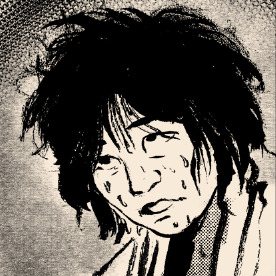
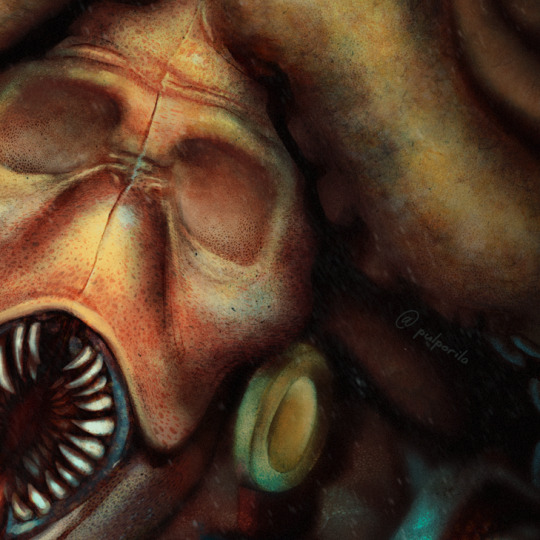

I made myself the goal of not returning until I had something to present, which is:
BOXEADORAS is continuing! I got 8 pages done, and only two left in order to submit to newground's sweet sixteen comic contest. More pages left to do after that, though :P
A speedpaint is up due early december. I'm not allowed to post it yet because it's for an exposition in my hometown, so here's a little sneak peek:

And finally, NEW SITE! It's pretty much a curated version of this blog + writings, new sketches and fanfics. If you ever get tired of social media, pop over there. I'll try to keep it updated as much as I can :)
As always remember that if you wish to see anything curated, my website is da option. I'm still deciding whether making a blog for the Boxing Gorls, but we'll see!
17 notes
·
View notes
Text
Ykw random blue period headcanons that might or might not happen in the canon and don’t have to coexist
- YatoYota roommates after Geidai
- We see Yuka’s younger brother, he does music
- Haruka moves to Geidai for his Master’s degree
- Murai gets 5 more tattoos
- YatoYota become cat parents
- Hashida and Murai meet in canon, enemies to lovers (please)
- Can’t see Yotasuke working in the direct art field tbh… maybe curator for a museum or something but I can’t see him selling artworks for a living, or maybe he becomes an illustrator but again not the kind that does expositions
- We see Miki playing volleyball
- Yotasuke comforts Yatora for once
- OVERGROWN ROOTS YATORA
- Mori and Yotasuke meet (???)
- Yotasuke gets a piercing (at least), Hashida gets a tattoo
- Yuka fashion designer
- we see Ayano’s back story
- Would Yatora still study after he finishes undergrad? (Aka would he afford it?)
- More glasses Yatora
- Fumi Kamiyama gets the attention I want her to have
- We see Yuki’s (Maki’s sister) graduation
- Last cover would be adult Yatora on the front (what if he wears glasses more then?) and everyone that helped him on the back (like hq 45)
- Timeskip close to ending, Yatora becomes a good artist and one of his paintings ends up motivating someone else to pick up drawing (like such series usually end)
I’d really hate it if the ending was him and Mori meeting again
#Blue period#yotasuke takahashi#yaguchi yatora#murai yakumo#hashida haruka#yuka ayukawa#fumi kamiyama#yatoyota
64 notes
·
View notes
Text

》 NAME ▪︎ call me VII or Vee! Velli to friends.
》 PRONOUNS ▪︎ she/her
》 MOST ACTIVE MUSES ▪︎ the Desalvars have rotted my brain entirely at the moment, but it tends to fluctuate. Sally was big on my mind recently, same with Angel. Nikodemus has kept the 1st spot consistently for several months though.
》 RP PET PEEVES ▪︎ frequent complaining about the rpc. specifically the types of rants that read like vaguing towards one person. if a post looks like it could've been a quiet soft/hardblock or a better curated dashboard, chances are I don't vibe with it.
》 EXPERIENCE/HOW MANY YEARS ▪︎ been roleplaying officially ever since i was 15 and happened to find an adoptables site with an rp forum. soooo 11 years, give or take!
》 FLUFF, ANGST OR SMUT ▪︎ angst! conflict's pretty nuanced and moments of pain are inevitable in life. both of those tend to be character-defining. fluff is second and fittingly following angst, even if it's kind of impossible for some of my characters. i do like giving my horde of bastards happiness though so it's pretty comforting to write - i guess i enjoy it the most. smut - writing meaningful, plotted intimacy with trusted rp partners can be pretty impactful, otherwise i find it gets difficult to write; and maybe a touch boring and repetitive.
》 PLOTS OR MEMES ▪︎ memes to start off ic AND ooc interaction, plots to keep it going and solidify it. prompts get the creative juices going, basically.
》 LONG OR SHORT REPLIES ▪︎ i wish i could say it depends but i'm always going off on some gatdamn tangent in my posts so i'd say medium. fingers crossed i can lean into shorter more concise replies though. basically: i like both. short's reserved for more casual, uneventful scenes, long for introspection/exposition/action heavy things.
》 TIME TO WRITE ▪︎ evening or night time, after 20:00/8 pm EET. don't perceive me before noon
》 ARE YOU LIKE YOUR MUSES ▪︎ mostly no, but i can't keep my personality out of my writing and character creation style so a lot of 'em incidentally ended up with transformative self-discovery character arcs. and no abs. and creative interest at least in some capacity lol.

Tagged by: @mvnces kith
Tagging: @vilestblood @und3rdark @valdorin @lasraichean @downs1de @chivalrites / @buckstops annnd you !!
#𝐒𝐄𝐕𝐄𝐍𝐓𝐇 ‒ ooc ║#me and my horde of worsties and my abysmal writing habits#questionnaire: time to write? me: piss off man i'm trying :')
6 notes
·
View notes
Text
Having now listened to all of The Magnus Archives ... hm, yeah, I think they made it out all right in the end. And I don't just mean that in a soppy I-can-only-stand-happy-endings sort of way (although, it's been a crappy few months, and to be honest I wouldn't mind a happy ending), but because I think there's a really satisfying conclusion to John's character arc if he finally figures out how it all works.
Er. John? Jon? I have seen it spelled both ways, and now I am confused. And the character seems to be named after his creator, which is not making me less confused. But the transcript uses "John", so I will go with that.
John's core problem is that he is constantly trying to take control of his life and his choices, but is never able to do so because the narrative won't let him. He undoubtedly makes several rash decisions that the audience can guess won't end well, but even in cases where he sits down and attempts to make the best choice possible he ends up playing into the hands of his enemies, because they are able to tightly control the information to which he has access. Things that seem rational based on what he knows end up being terrible choices, because of how well curated "what he knows" happens to be.
There's a thing a lot of the characters do, where they describe the logic of their world as akin to dreams or nightmares:
SIMON
No, no, no, you’re right, of course. The thing you have to remember is that no one actually knows how these things work – not really.
There’s always been plenty of theories, of course, and over a century or two you do start to get an intuitive feel for it, but… there’s really no hard-and-fast rules.
The powers, or entities, or fears, or whatever you want to call them, are bound up in emotion. In feeling. How they exist, what they can do, how they interact with the world… it all makes about as much logical sense as a nightmare.
[MARTIN INHALES]
Which is to say, there is a certain sort of emotional logic to it all: things feel like they flow together in a way that makes sense, but if you try to stop and do the maths, then it all comes apart. At least, in my experience.
– Simon Fairchild, doing the exposition for characters and audience alike. Big Picture
But, as Simon points out, the trouble is that none of them really understand what they're talking about. Few people in this world seem to dedicate actual time to understanding it – most are either seduced or destroyed (or some weird combination of the two) by the power that comes with worship and terror.
So they get close, but they miss the point: it's not dream logic, it's story logic. There's a reasonable amount of crossover, of course: both deal in emotion and theme and imagery. We'll forgive a plot hole or continuity error in a story if the narrative feels right, and nobody is surprised if their dreams don't have coherent worldbuilding in them. But stories have purpose in them in a way that dreams do not. They're trying to say something that you need to think about. You can't really tell somebody about a dream without imposing narrative logic on it that wasn't necessarily there when you dreamt it, and most dreams simply fade away into nothingness once you've had them. But a narrative is shaped, and if it's good it can live virtually forever. You can't control a dream, but you can and should control a narrative.
That's the thing John finally works out.
I mean - of course it's got story logic, right? It's a story. It's a piece of fiction, so it's got themes and tropes and character foils and recurring imagery and all that jazz. But beyond that, it is a story made up of a patchwork of other stories: most of the episodes contain a little self-contained supernatural story with its own protagonist and its own ending; over the top of that lie a series of recurring characters who pop up across multiple episodes, and whose personal stories you can learn, and who will intersect with each other to build a historical narrative that explains how we got here; and on top of that are the characters who live closest to the present – John and whichever assistants are still alive at any given moment – and their struggle to deal with all this.
It's that patchwork that makes up the net in which John is caught for most of the series: because he is only able to follow the narrative, he is not able to control it. Yes, he is directly manipulated by actual characters in the story – most prominently by Jonah Magnus and Annabelle Cane – but it is mostly the story itself that keeps him locked in place.
In most cases, there is nothing whatsoever he can do about the various events that take place in the story. He's almost always reading about something that happened anywhere between years and centuries prior. Even when he's acquired enough information to understand what's happening in these stories he can't do a single damn thing for the characters. They either made it out on their own or they didn't.
Occasionally the story moves closer to the present, usually at season end but in a few other places as well, but even then he is still following behind the narrative. The story isn't about him, but his predecessor: "Why was Gertrude Robinson murdered? What did she know?" He is following the story of a dead woman. Her story is well and truly over, but he cannot catch up to the end of it.
Because the thing about the Archivist is that – well, it’s a bit of a misnomer.
It might, perhaps, be better named: The Archive.
Because you do not administer and preserve the records of fear, John. You are a record of fear, both in mind as you walk the shuddering record of each statement, and in body as the Powers each leave their mark upon you.
You are a living chronicle of terror.
– Technically John speaking, but in practice Jonah Magnus monologuing about his evil plan. The Eye Opens
His whole purpose in the story is to read (or on a few notable occasions hear) something bizarre, express a general "What the actual fuck was that?" and move on, without any ability to act on what he has learned.
But there is logic to their world. Season five – well, technically the finale of season four – turns the implicit into the explicit.
It does tickle me, that in this world of would-be occult dynasties and ageless monsters, the Chosen One is simply that – someone I chose. It’s not in your blood, or your soul, or your destiny. It’s just in your own, rotten luck.
– More of Jonah Magnus being smug. He does go on a bit. The Eye Opens
The thing is, though: you aren't a Chosen One unless you're in a story. That's a narrative archetype. Even if you attempt to impose the idea on a historical event, you're only doing so retroactively by slotting a person into a particular narrative framework that probably does not match reality. It's unsurprising that Magnus had to build his horrifying fantasy world out of the trappings of a quest narrative: his whole power base is built out of collected stories. But if that's the world you make, you end up with a very specific set of rules.
Consequently, John spends much of the season explaining why they have to follow the rules of a quest narrative in order to actually go anywhere.
ARCHIVIST
(heh) You see that tower, way off in the distance?
MARTIN
(don’t like where this is going) Yeah. (beat, sigh) It’s watching us, isn’t it?
ARCHIVIST
The Panopticon and the Institute. Merged into something entirely new.
MARTIN
(splutter-scoff) Wai– what? No, there’s, there’s no way we can see it from here. We – We must still be a hundred miles from the border, never mind London!
ARCHIVIST
You could see that tower from anywhere on Earth. And it can see you. And if you walk towards it, eventually you’ll get there. But you have to go through everything in between.
[Pause.]
MARTIN
(bright) You’re being ominous again.
ARCHIVIST
(ah!) Sorry. Sorry.
MARTIN
What do you mean ‘everything?’ What’s out here?
[The Archivist inhales. As he does so, there’s a sort of creaking – and then we hear the weakest strains of bagpipes beginning to fade through.]
ARCHIVIST
Nightmares. Come on, that trench is our first.
– John, taking a turn at the exposition. In the Trenches
Dreams don't work that way – or at least they don't have to. Dreams can drop you into any situation and pull you out of it again with neither logic nor explanation. But if you are heading to a dark tower to confront an evil wizard ... well, then, everybody knows that you have a lot of walking to do. That you must meet friends and foes along the way and fight smaller battles before you fight the big one. It's how it goes.
It's even more explicit – almost painfully so – when dealing directly with character development.
ARCHIVIST
Alright.
[MORE WALKING]
Next one’s through here.
BASIRA
Next one?
ARCHIVIST
Her latest victim.
[DOOR IS WRENCHED OPEN WITH A METALLIC CREAK]
[MARTIN REELS, SOUNDS OF FLIES BUZZING]
Recognise her.
BASIRA
…
No… I don’t think I do.
ARCHIVIST
That wasn’t a question. It was an instruction. We can’t move on until you do.
MARTIN
John, what are you getting at?
ARCHIVIST
This isn’t just a journey through spaces.
– Basira preferring not to do introspection in a literal hellscape, but John has worked out the narrative rules so it's confront-your-past day in the apocalypse. The Processing Line
John is not wildly unusual in being a specific person's Chosen One: you can make the word "destiny" do a lot of work, and the poor bastard in the role is as often as not the favourite of a god, or the only child of a king, or the last of something bearing the duty of a larger group.
He is somewhat more unusual in being two people's Chosen One, and somewhat moreso again by being broadly opposed to the thing he was chosen to do. But the core thing is that this is a known role; it's a structure you can work with. Eventually. When you're in a position to do so.
Martin figured it out a season earlier.
MARTIN
It’s not him! It’s not anybody. It’s just me. Always has been. I…
When I first came to you, I thought I had lost everything. John was dead, my mother was dead, the job I had put everything into trapped me into spreading evil and I… I really didn’t care what happened to me. I told myself I was trying to protect the others, but… honestly we didn’t even like each other. Maybe I just thought joining up with you would be a good way to get killed.
And then… John came back, and… and suddenly I had a reason I had to keep your attention on me. Make you feel in control so you didn’t take it out on him. And if that meant drifting further away, so what? I’d already grieved for him. And if it meant now saving him, it was worth it.
When you started talking about the Extinction, though… you had me actually, then, for a while. But then – (laughs sardonically) then, you tried to make me the hero. Tried to sell me on the idea that I was the only one who could stop it. And that I’ve never sat right with me. I mean, I mean, look – look at me, I’m not exactly a – a chosen one. But by then I was in too deep. So I played along. Waited to see what your end game was, and here we are.
Funny. Looks like I was right the first time. It’s probably still a good way to get killed?
– Martin explaining that he was just stringing the villains along. Panopticon
The thing is, he is Peter Lukas's Chosen One. The reasoning behind it is cruel, but I can think of a few stories about gods making bets on what humans will do. But he works out what kind of story they're trying to tell him, and turns it to his advantage.
This is a good one. Everybody knows this one: one of the characters is betraying the others and working with the villains. It isn't because he wants to; it's because his hand has been forced. But it's a trap. It will get him killed. It will get his friends killed. The villains are lying to him about what they mean to do and how far they mean to make him go. The audience knows this, but the characters just keep digging their holes deeper and deeper ... until the sudden reveal that it was a con all along. The "traitor" never intended to turn on his friends. It was part of the plan. It's a classic. It's basically the plot of The Sting. Who wouldn't want a turn at being Robert Redford?
And it works. Martin gets everything he wants out of that ploy: Lukas is destroyed, "Elias" is unmasked as Jonah Magnus, John makes good on his earlier commitment to run away with him, and he skips the eye gouging. You can't fault his results. The problem is, Martin is a secondary character. He doesn't quite have the narrative weight to resolve the primary conflict. That plot revolves around him but the plot does not, so in the longer term, things continue to get worse.
But he does prove it can be done. If you recognise what kind of story you are in, and the different ways that kind of story can go, you can grab on a narrative thread and steer it in a direction that works for you.
ANNABELLE
We found the one we believed most likely to bring about their manifestation. We marked him young, guided his path as best we could. And then, we took his voice.
ARCHIVIST
No…
ANNABELLE
His, and those he walked with. We inscribed them on shining strands of word and meaning, and used them to weave a web which cast itself out through the gate and beyond our universe. So that when the Fears heard that voice, and came in their terrible glory, they might then travel out along it.
Or be dragged.
BASIRA
Is she talking about the tapes?
ARCHIVIST
Yes.
– In which Annabelle explains why there are tape recorders everywhere. Connected
You can say voice or tapes, but that's missing the point: it's stories that will carry these beings out of the world. Two hundred odd narratives about godlike beings with insatiable hunger and Lovecraftian pretensions who can travel to other worlds when the denizens of those places hear the tales. That has its own uncomfortable implications, sure, but if you've been paying attention you know something else about those stories:
ARCHIVIST
Statement ends.
(sigh) One thing that always strikes me when I read statements like this is… the bias of survivorship. With one or two notable exceptions, the only statements the Institute receives are those where the witness has successfully escaped whatever terrible place or being has marked them for a victim. I wonder how many don’t make it out. How many of those shapes in the water were once just like Mr. Shakya.
– John is being gloomy, but he has hit upon an important point. Submerged
They are largely stories in which humans beat the monsters. They are stories about how to survive. You can do a horror story with a catastrophic ending, of course. It can have a great impact. But probably not two hundred of them in a row. That would be hard going on the listener: another week, another corpse. So these are largely hopeful stories – with those noted exceptions, of course.
I've seen the memes: I know Joshua Gillespie, who beat a coffin that wanted to consume him with a bowl of ice, is a favourite. Of course he is: that's genius. Or Dylan Anderson, who just ... covered a homicidal pig in concrete. Characters like Gerard Keay and Adelard Dekker are attractive because when they arrive on the scene, the supernatural becomes no more than another problem to be solved with just the right application of human ingenuity (and Dekker, notably, is probably the source for the concrete trick – you cannot fault results).
There are two possible threads to pull on here: you can pull on the thread of supernatural horror, or the thread of human resourcefulness in the face of adversity.
SASHA
Why record it?
ARCHIVIST
What?
SASHA
Before, in the office. It, it was stupid going for the tape recorder like that, and then when you dropped it out there –
ARCHIVIST
I said I was sorry. If I’d known Martin had another one stashed in here, I never would have…
SASHA
No, it’s, it’s fine, just… I just don’t understand. I thought you hated the damn thing. You’re always going on about it.
ARCHIVIST
I do! I did. I just… I don’t want to become a mystery. I refuse to become another goddamn mystery.
SASHA
What?
ARCHIVIST
Look, even if you ignore the walking soil-sack out there, and the fact that we are probably minutes from death, there is still so much more happening here.
MARTIN
I’m not sure we can really ignore the –
ARCHIVIST
Every real statement just leads… deeper into something I don’t even know the shape of yet. And to top it all, I still don’t know what happened to Gertrude. Officially she’s still missing, but Elias is no help and the police were pretty clear that the wait to call her dead is just a formality. If I die, wormfood or… something else, whatever, I’m going to make damn sure the same doesn’t happen to me. Whoever takes over from me is going to know exactly what happened.
– John, making bad tape-recorder related decisions. Infestation
And there is mystery. That is another thread you can pull on. Because in the end, Gertrude wasn't a mystery at all. Her activities, her personality, her associates, her strengths and her weaknesses are all pretty well documented. She's dead on the floor with three bullets in her. She's the reason they're in this mess, because she did the thinking Jonah Magnus could not and set him on his path. She would hate that with every fibre of her being – but it is known. What you know about her is that she failed, and she died.
John is wrong, in the above, because of course he is. He doesn't know anything yet, except that his workplace is probably evil and currently full of worms. He hasn't worked out the story logic, yet, and he doesn't yet see the difference between knowing and understanding.
Mystery. What if? That's a powerful plot thread you can pull on, if you're in the right place and you are desperate enough.
There's what he can't do, in the end. He can't trap the weird fear entities in the world and starve them to death. Annabelle knew exactly what buttons to push to get him heading in that direction, sure, but it was never going to work. I don't even mean the business with the lighter, although that's the practical way this was set up. I mean this is a five-season series in which the temples of these dark gods are repeatedly destroyed by fire, book burning is a recurring motif, and "What if we made it explode?" is always a solid cross-generation Team Archives plan. For heaven's sake – The Magnus Institute has basically the same fatal flaw as The Death Star. We're blowing it up in the finale. We just are. It's that kind of story. It doesn't matter what he wants. There was never anything there for John to pull on.
But this?
ARCHIVIST
Do it! The knife’s just there. Let them go.
MARTIN
[Tearful] I’m not going to kill you!
ARCHIVIST
Cut the tether. Send them away.
Maybe we both die. Probably. But maybe not. Maybe, maybe everything works out, and we end up somewhere else.
MARTIN
Together?
ARCHIVIST
One way or another. Together.
– Absolute last-minute planning, because that's how they do things. Last Words
It can seem to come out of nowhere, unless you've been watching him put it together. His world runs on narrative logic. He is the Chosen One atop a burning tower, on a terrible quest. He's faltered a bit, at the last minute, because if you don't shake hands with Frodo Baggins on the way past you are not respecting your ancestors. He's aware of most of this because he's spent most of the season tiredly explaining to his travelling companions that, yes, the journey is a damn metaphor. He is backed by dozens of stories where people escaped at the last by determination, or connecting with their loved ones, or just ... not being all that interested in worshipping dark gods.
Magnus is dead. The entities are packing their bags and running for the exit. There is no one left to care what he does next – except Martin, who would also like a way out of this mess. He has spent years struggling to understand what kind of story he's in and what his role is supposed to be, but now he gets it and is finally, finally the person in the room with a bit of power.
He does not say "Maybe the girls will dig us out of the rubble and we can go home and pretend this never happened". That would be the best possible result for them, of course, but it wouldn't work. No one would believe it. But what he can do is follow the example of all the people that came before because, crucially, "Fuck it, I am not dying today because I don't want to" and "Look, this is the power of love and I am holding on to it in the face of the worst crap I have ever seen" really are the strategies that work. And now he's in the one moment of the story where there is no one else's story left to precede him. This is the only moment in the whole series where the story is really his, and he can decide what happens next.
And what happens next is a question. The question is "What happens next?" It is a thing that is ongoing, rather than a thing that has ended.
I've no doubt he created more problems for himself, and for Martin. You grab that narrative thread and you are literally asking for them: even the kindest of stories won't give you a "happily ever after" until you have solved The Problems. You would only pull that one if you were desperate, but under the circumstances it was probably warranted.
But maybe, this time, they can run ahead of the narrative instead of behind. That makes all the difference.
14 notes
·
View notes
Text
currently not being nagged by a specific fic on my to do list so it really is like spinning a wheel and seeing where it lands by tonight like will it be peeping tom phantom? fucking in a cemetery with mary goore? curator!reader ministry exposition courtesy of the cardinal? could be anything at this point
10 notes
·
View notes
Note
"JJK really went from a loved manga to a mid-to-bad story with insufferable fans 🙏 may more of us hate it in the future. It snatches the spotlight from genuinely good shows and its another case of "general shonen fan will call any trash 'goat' if the fight is well animated".
I used to be a fan, until the start of the culling game. And after this controversial, inconsistent and inhumane adaptation of shibuya, im glad that I have no interest in both manga and show anymore"
Do you think Culling Game really that hard to understand? Cause I saw quite a llt got turned off to JJK since that arc....
⚠️ Content Warning (no real spoilers) for the Culling Games arc. Nothing in depth to warrant burying beneath a "Keep Reading" but fair to mention just in case.
I don't know how to say this without generalizing negatively but the sentiments very much sound like they came from a cishet dudebro. I've noticed that shonen series' that have a fanbase made up of vocal queer people and/or womxn fans are widely renowned for their "insufferable fans" and this specifically is applied to JJK and MHA across social media. I wonder why.
From the lack of sexualization of female characters/students, the immediate shutdown that Nobara was going to fall for Yuji or Megumi in typical shonen fashion, the cast of men being curated for the female gaze across the manga and anime adaptation (Gojo, Geto, Nanami, Toji, etc.), the overt queer coding and presence of canonically queer/trans characters... also, the simple fact that the canonically attractive and OP characters aren't insufferable assholes? Maybe that's just a me thing but it seems like these factors have been rubbing certain people the wrong way.
Re: the animation of Shibuya and the practices that delivered the work with such an insane timeline and not to the quality of the team of animators' liking... that's valid. But that is a Mappa shortcoming in an effort to snatch up all the prolific and iconic adaptations they can, not a JJK shortcoming. As such, throwing the baby out with the bathwater there doesn't seem like a particularly sound argument but just a means to pile on.
A/N: As it stands, Mappa held the reigns on AOT's final season (taking over from Wit Studio due to production schedule), S2 of Vinland Saga (taking over from Wit Studio due to production schedule), JJK S1, JJK 0 movie, CSM adaptation of S1, Hell's Paradise adaptation of S1, JJK S2, CSM movie adaptation for Reze Arc, Zom 100... all since 2020 and does not encompass other, smaller series'.
I'll concede, it makes sense that the culling games left a lot of readers lost in the forest, myself included. Not the point of the games since we know, to what end, Kenjaku!Geto hopes to achieve at this point.
I think readers were stymied by how much time was spent on developing unique characters who were offed like.. a chapter later. A necessary evil to maintain the living core cast of characters who would later have to take on the Big BadsTM while also moving along the point system for the Culling Games. It seems like Gege Akutami took their time to cultivate these mini-fights though it wasn't clear to what end from a plot standpoint... yet. Empirically, we've seen small details woven back into the story which didn't seem apparent at the time given the exposition style of the mangaka.
As a reader, I love guessing at the end of stories. You can see the crackpot theories that pepper the Manga With Me tag. But the Culling Game arc spans long enough to lose the plot and make it so much harder to forecast where the story is going. Especially when Gege Akutami generally seems like a troll of a person anyway.
I think the Culling Games happening immediately after the Shibuya arc was a choice. Based on anime only fan reactions to Shibuya, what's to come is not for the faint of heart fans. Especially when you consider the losses suffered in Shibuya are immediately eclipsed by the regular losses and disappointments within the Culling Games. However, as a fan, I'mma let Gege cook even if they're using my tears and angst as seasoning because we haven't seen enough of the story to determine the Culling Game's true place/meaning within it.
I think, story wise, they started off too strong with emphasizing Gojo's overpoweredness. Subsequently, they had to write in caveats and build ways to close the gaps between him and other characters to allow for the story to press forward with or without him. I still don't know how this story is going to end though I think I have a new hypothesis from the last time I guessed at who would survive.
At the end of the day, it's definitely that person's opinion to jump back in once more of the story has been fleshed out should they choose to do so because a lot of people don't like dealing in uncertainties. Whatever they decide, don't let it sway your enjoyment one way or another, anon. ❤️
#neon asks#anon asks#jjk#jujutsu kaisen#manga#anime#mappa#mappa studio#culling games#culling game arc#gege akutami
7 notes
·
View notes
Photo

DF in Artension! Our Up Coming Exhibition 😉 ☺️ Le collectif émergent du Déstructuralisme figuratif revient du 1® au 10 octobre 2022 au parc floral de Paris, avec une programmation époustouflante d'artistes contemporains. Fort de trois ans d'expérience fondés sur le recrutement 'artistes à travers la planète, DF Art Project se mobilise pour presenter pour la troisième fois son collectif international au sein des 360 m? du Pavillon 18. Dans cet écrin du parc floral, véritable poumon vert de la capitale qui enchante chaque année 1 million de visiteurs, plus de 70 artistes exposent cette année leur vision commune de 'art autour du Déstructuralisme figuratif. Le Déstructuralisme figuratif est une réflexion sociétale où les possibilités d'émancipation de l'homme comme 'autonomie de son imaginaire se redefinissent. Cette conceptualisation de pratique artistiques autour de la fragmentation de la figure réunit la peinture, la sculpture, la photographie, le dessin, le collage, l'art numérique, la performance et 'installation. L'exposition au Pavillon 18 est désormais la grande rencontre annuelle du DF Art Project qui, depuis 2019, maintient une ligne artistique forte. Rendez-vous du 1 au 10 octobre 2022 pour profiter de cette véritable promenade artistique dans un environnement naturel afin de découvrir des artistes témoins de notre temps. #artensionmagazine #artension #exposition #upcoming #upcomingexhibition #exhibition #exhibitions #paris #quefaireaparis #explore #parcfloral #parcfloraldeparis #gallery #curator #artcurator #artcurators #october #octoberexhibition #destructuralismefiguratif (at Parc floral de Paris château de Vincennes) https://www.instagram.com/p/CiKkb5FD6_h/?igshid=NGJjMDIxMWI=
#artensionmagazine#artension#exposition#upcoming#upcomingexhibition#exhibition#exhibitions#paris#quefaireaparis#explore#parcfloral#parcfloraldeparis#gallery#curator#artcurator#artcurators#october#octoberexhibition#destructuralismefiguratif
1 note
·
View note